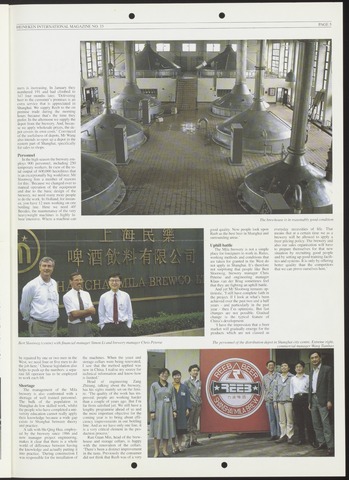HEINEKEN INTERNATIONAL MAGAZINE NO. 33
PAGE 5
The brewhouse is in reasonably good condition
good quality. Now people look upon
Reeb as the best beer in Shanghai and
surrounding areas.'
Uphill battle
The Mila brewery is not a simple
place for foreigners to work in. Rules,
working methods and conditions that
are taken for granted in the West do
not apply in Shanghai. It's therefore
not surprising that people like Bert
Slootweg, brewery manager Chris
Peterse and engineering manager
Klaas van der Brug sometimes feel
that they are fighting an uphill battle.
And yet Mr Slootweg remains op
timistic. 'I still have complete faith in
the project. If I look at what's been
achieved over the past two and a half
years - and particularly in the past
year - then I'm optimistic. But fast
changes are not possible. Gradual
change is the typical feature of
China's development.
T have the impression that a freer
market will gradually emerge for the
products which are not classed as
everyday necessities of life. That
means that at a certain time we as a
brewery will be allowed to apply a
freer pricing policy. The brewery and
also our sales organisation will have
to prepare themselves for that new
situation by recruiting good people
and by setting up good training facili
ties and systems. It is only by offering
better quality than the competitors
that we can prove ourselves here.'
The personnel of the distribution depot in Shanghai city centre. Extreme right,
commercial manager Wang Tianbao
mers is increasing. In January they
numbered 191 and had climbed to
347 four months later. 'Delivering
beer to the customer's premises is an
extra service that is appreciated in
Shanghai. We supply Reeb to the on
premise trade during the morning
hours because that's the time they
prefer. In the afternoon we supply the
depot from the brewery. And, becau
se we apply wholesale prices, the de
pot covers its own costs.' Convinced
of the usefulness of depots, Mr Wang
also intends to open up a depot in the
eastern part of Shanghai, specifically
for sales to shops.
Personnel
In the high season the brewery em
ploys 900 personnel, including 250
temporary workers. In view of the to
tal output of 600,000 hectolitres that
is an exceptionally big workforce. Mr
Slootweg lists a number of reasons
for this: 'Because we changed over to
manual operation of the equipment
and due to the basic design of the
brewery, we need many more people
to do the work. In Holland, for instan
ce, you have 12 men working on one
bottling line. Here we need 40!
Besides, the maintenance of the very
heavyweight machines is highly la
bour intensive. Where a machine can
Bert Slootweg (centre) with financial manager Simon Li and brewery manager Chris Peterse
be repaired by one or two men in the
West, we need four or five men to do
the job here.' Chinese legislation also
helps to push up the numbers: a sepa
rate lift operator has to be employed
to work each lift.
Shortage
The management of the Mila
brewery is also confronted with a
shortage of well trained personnel.
The bulk of the population in
Shanghai do low skilled work, whilst
the people who have completed a uni
versity education cannot really apply
their knowledge because a wide gap
exists in Shanghai between theory
and practice.
A talk with Hu Qing Hua, employ
ed by the brewery since 1986 and
now manager project engineering,
makes it clear that there is a whole
world of difference between having
the knowledge and actually putting it
into practice. 'During construction I
was responsible for the installation of
the machines. When the yeast and
storage cellars were being renovated,
I saw that the method applied was
new in China. I realise my source for
technical information and know-how
is limited.'
Head of engineering Zang
Zhitung, talking about the brewery,
has his sights mainly set on the futu
re. 'The quality of the work has im
proved; people are working harder
than a couple of years ago. But I'm
far from satisfied yet. We still have a
lengthy programme ahead of us and
the most important objective for the
coming year is to bring about effi
ciency improvements in our bottling
line. And as we have only one line, it
is a very critical element in the pro
duction process.'
Run Guan Min, head of the brew-
house and storage cellars, is happy
with the renovation of the cellars.
'There's been a distinct improvement
in the taste. Previously the consumer
did not think that Reeb was of a very

